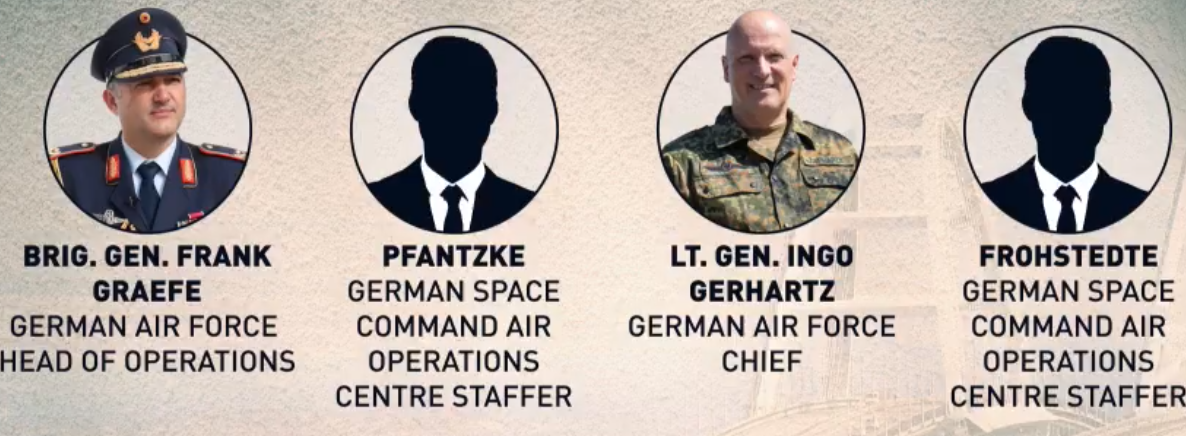Last week, Russian media unveiled a 38-minute audio recording capturing a crucial online conversation among senior German military officials discussing strategies to support Ukraine against the Kremlin's invasion. The German government has authenticated the legitimacy of this intercepted call, shedding light on a series of sensitive discussions and subsequent reactions.

- Taurus Cruise Missiles: German Air Force Chief Ingo Gerhartz and three high-ranking Luftwaffe officials deliberated on the potential delivery of Taurus cruise missiles to Kyiv. Notably, Chancellor Olaf Scholz had publicly rejected such a move.
- Training of Ukrainian Soldiers: The conversation extended to the training of Ukrainian soldiers, contemplating military targets for the missiles, including the crucial bridge connecting the Russian mainland to Crimea and Russian ammunition depots.
- Allies' Operations: The intricacies of allies' operations surfaced, revealing the deployment of British personnel in Ukraine and the involvement of Britain's Storm Shadow and France's Scalp missiles. Satellite data exchange for missile programming was also discussed.
- Security Protocol Critique: The use of a standard platform like WebEx for discussing military secrets drew criticism, with some viewing it as a systemic underestimation of security threats in Germany.

- Allies' Response: While Germany's allies, including Britain, refrained from public criticism, former British Defence Secretary Ben Wallace expressed concern, stating that the incident highlighted Germany's vulnerabilities.
- Political Sensitivity: The leaked discussion underscored the political sensitivity of deploying Taurus missiles. Chancellor Scholz remains cautious about direct German involvement in the Ukraine conflict to avoid escalating hostilities.
Als deutscher Bundeskanzler werde ich keine Soldaten unserer Bundeswehr in die Ukraine entsenden.
Die NATO ist – und wird – keine Kriegspartei.
Dabei bleibt es. pic.twitter.com/6Ya23Zt54l— Bundeskanzler Olaf Scholz (@Bundeskanzler) February 28, 2024
- Russian "Hybrid Disinformation Attack": Germany has labelled the leak as a Russian "hybrid disinformation attack," aiming to create discord within the country and among allies. Accusations of war preparations are dismissed as "absurd" propaganda.
- Investigation Ongoing: German authorities are investigating the incident, although it remains unclear if security protocols were breached. No personnel have been terminated as a result.
'It's German Chancellor v His Military and the Minsk Agreements All Over Again!' - Russian FM on the Audio Leaks
Sergey Lavrov discussed Friday's revelations and how they show a disunited Germany, with a nod to the allegation that US & UK military are already on the ground in… https://t.co/NVGge6MXZY pic.twitter.com/ezD8SBfivi— RT_India (@RT_India_news) March 2, 2024
- Accusations against Germany: The Kremlin contends that the recording indicates Germany's armed forces were considering strikes on Russian territory. Russia seeks clarification on whether this reflects government policy or if Chancellor Scholz has lost control of the situation.
- Spying Concerns: Germany, a significant provider of military hardware to Ukraine, has been a prime target for Russian spying operations. Recent arrests, including a suspected BND employee and a military procurement agency officer, highlight the persistent espionage threat.
Russian Foreign Ministry spokeswoman Maria Zakharova has demanded answers from Germany after a recording was leaked of senior military officials discussing plans for an attack on the Crimean Bridge using German-supplied Taurus missiles pic.twitter.com/Z6JqlFTri9— RT (@RT_com) March 5, 2024
This security breach underscores the intricate challenges and geopolitical tensions surrounding military discussions in the digital age, with implications for Germany's international standing and the ongoing conflict in Ukraine.
Media sources: X
ⒸCopyright 2024. All Rights Reserved Powered by Vygr Media.
























